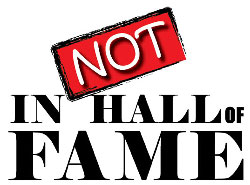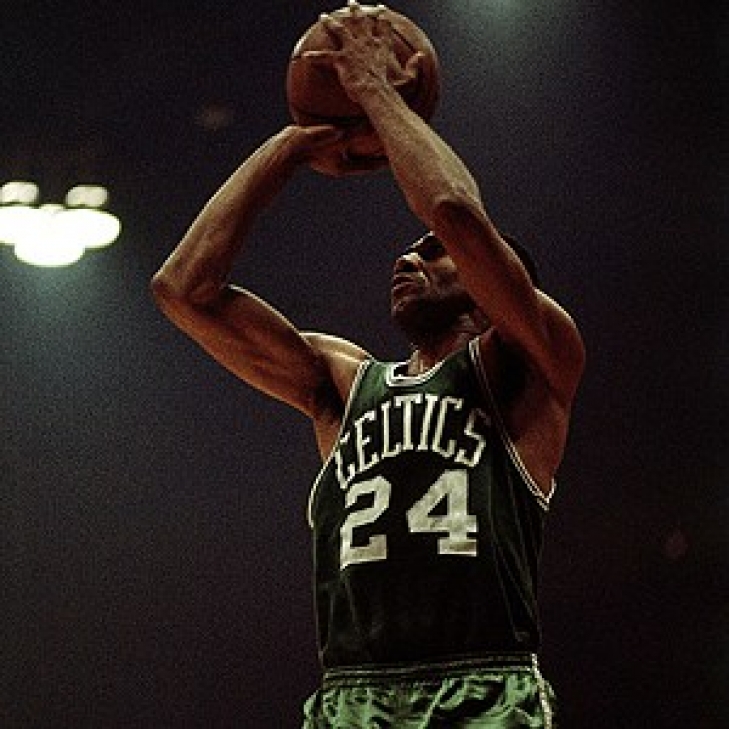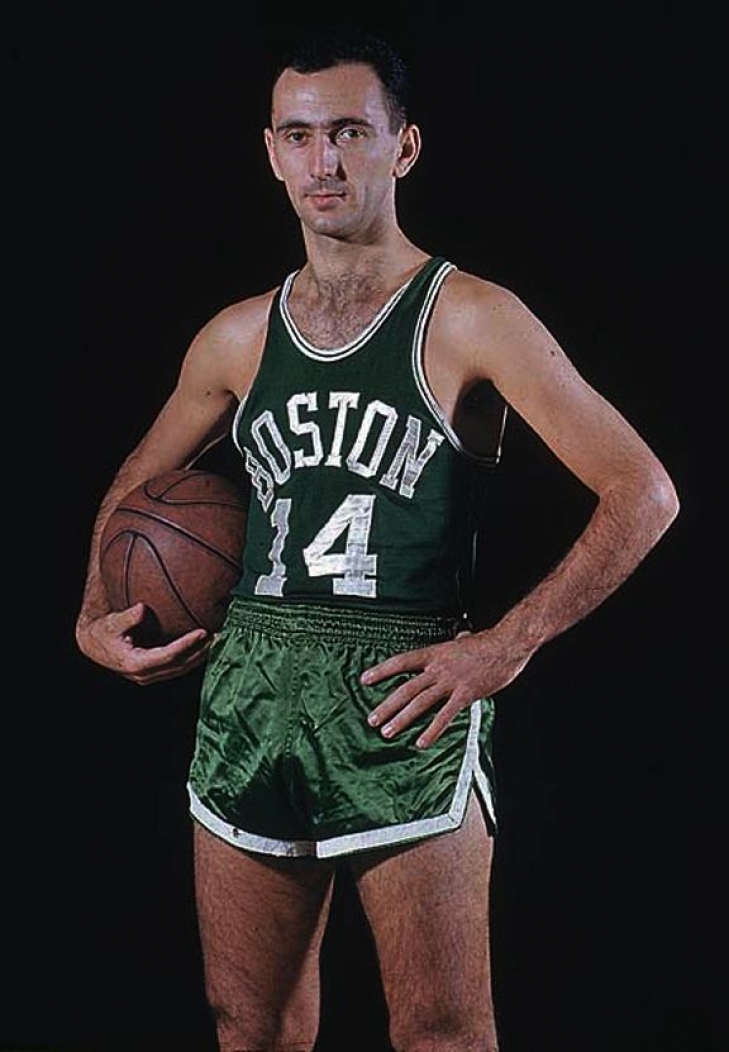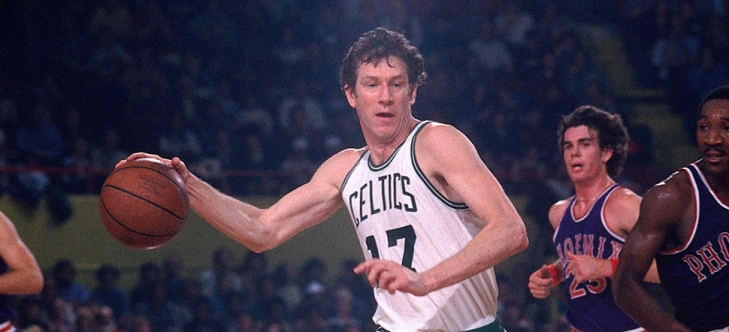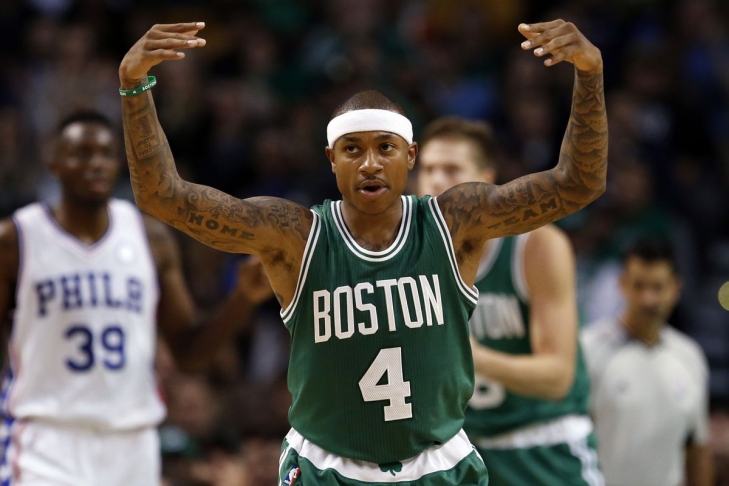17. Frank Ramsey
From Kentucky, and a former star at the University of Kentucky, the appropriately nicknamed "Kentucky Colonel," Frank Ramsey, was a champion in the NCAA and helped lay the groundwork for the Celtics dynasty that would begin in the last half of the 1950s. Ramsey was not the star of the team for Boston like he was as a Wildcat, but he was an efficient player with excellent court vision who was selfless, an essential attribute for those early Boston powerhouse teams. As such, he was an important piece to helping the Celtics win their first seven titles, and over his nine-year career (all with Boston) he would average 13.4 Points per Game.
11. Ed Macauley
While this ranking might seem high considering that Ed Macauley did not win the NBA Championship with the Boston Celtics, this was a man who would become a Naismith Basketball Hall of Fame inductee primarily from what he did in Boston before they would become the franchise that we all know and (maybe) love.)
10. Dave Cowens
Dave Cowens stood at 6' 9", which while it is undoubtedly a tall frame, he played at Center, making him a little undersized for that position in the 1970s. Cowens made up for that with sheer determination, savvy and every inch of his body to be one of the most complete players in the game and this was showcased immediately, as he was the Rookie of the Year in 1970-71. Cowens would become a two-time NBA Champion with Boston in 1974 and 1976 and was a surprise MVP in 1973 (he was not a First Team All-Pro that year). An eight-time All-Star, Cowens holds the distinction of being one of the few players in NBA history to lead his team in all five major statistical categories (Points, Rebounds, Assists, Steals, and Blocks) in a season (1977-78). At the point of his retirement (he would come out of retirement and play with Milwaukee for half a season) he averaged 18.6 points and 14.0 Rebounds per Game.
9. Bill Sharman
Bill Sharman's path to the Boston Celtics arrived when he was traded from the Fort Wayne Pistons' who acquired him in the dispersal draft of the Washington Cougars. It worked out well for Boston as Sharman entered his second year as a pro and in his third season, he would begin an eight-year streak as an All-Star, which included three First Team and four Second Team All-NBA Selections. Sharman, who would help the Celtics win four NBA Championships would prove to be one of the most efficient shooters of his era and was in the top ten in Points per Game seven times and Field Goal Percentage six times. Sharman was deadly at the charity stripe as the Shooting Guard would lead the NBA in Free Throw Percentage seven seasons, which included a five-year consecutive streak from 1952-53 to 1956-57.
8. Sam Jones
Sam Jones played at North Carolina Central, no not the University of North Carolina, so he was not highly recruited on the NBA level, but Red Auerbach took a chance on him after being told by his scouts that this was, in fact, the best player in the state. The gamble proved fruitful as the versatile Jones would prove to be one of the best clutch shooters of his era, so much so, that he was nicknamed "Mr. Clutch."
7. Kevin McHale
An occasional visitor at Cheers, Kevin McHale, would play his entire NBA career with the Boston Celtics where he was as selfless as he was popular. McHale was drafted in third overall in 1980, and he would become part of Boston's "Big 3" of the 1980s with Larry Bird and Robert Parish. McHale was excellent in the paint both on offense and defense, showing off excellent shooting skills and blocking ability. The quintessential Power Forward, McHale regularly abused his opponents whether he was starting or coming off of the bench, the latter of which often occurred and he rewarded the Celtics with that decision by winning the Sixth Man of the Year in both 1984 and 1985.
6. Robert Parish
Think about this for a minute. Robert Parish logged 1,102 regular season games for the Boston Celtics, which is well more than most players do in their entire lifetime. That was only 1,102 of 1,611 that the Chief would play in the NBA!
5. Paul Pierce
Paul Pierce had a good rookie season (1998-99) where he averaged a little over 16 Points per Game, but it is unlikely that even the biggest diehard Celtic fan knew how good he would be. Pierce would explode two years later with a 25 PPG year, which was followed by five straight All-Star seasons that included a pair of Third Team All-NBA Selections. Nicknamed "The Truth", Pierce was an elite shooter and a more than competent court general, but the Celtics didn't have much around him, and they couldn't escape the middle of the Eastern pack until the Boston management swung for the fences landing Ray Allen and Kevin Garnett and this version of the "Big 3" would win it all in 2008 and Pierce would begin a second five-year All-Star run. In those Finals, Pierce would win the MVP, which was so appropriate given how long he carried the team before he got the help he needed.
4. Bob Cousy
There aren’t too many times where a player becomes a Hall of Famer in a career with a team who never wanted him in the first place.
Serious. The Celtics had the number 1 pick in the 1950 Draft, and they passed on Cousy, who was a local kid and a star at Holy Cross. The Tri-Cities Blackhawks chose the Point Guard at number 3, but Cousy refused to report, and the NBA brokered him to the Chicago Stags, who subsequently folded. Three Stags were made available for dispersal, Max Zaslofsky, Andy Phillip and Cousy, and the Celtics landed Cousy…who again they didn’t want.
3. John Havlicek
Before we begin, just being nicknamed “Hondo” is enough for us to put John Havlicek in our top five!
Havlicek was the 7th Overall Pick from the 1962 Draft, and he would go on to be the most tenured player in Celtics history with 16 seasons and 1,270 games under his belt. He rarely missed games, led by example and was a lethal weapon on both ends of the court. "Hondo" would develop into the game's first real swingman, moving effortlessly from guard to forward. From 1965-66 to his retirement, he was a perennial All-Star and would average 20.8 Points per Game. This is no surprise, which if you look at his overall tenure he is the Celtic's all-time leading scorer.
2. Larry Bird
While we said that anointing Bill Russell was a lock as our top Boston Celtic of all-time, Larry Bird gave us pause.
Before Bird's arrival to Boston, the franchise was in disarray after being without question the most dominant franchise in the league. The city craved basketball greatness, and Bird gave them just that. Bird was the 6th overall pick in 1978 but joined a year later after staying at Indiana State for his senior year. As expected, Bird was an automatic superstar winning the Rookie of the Year and being named to his first of what would be 12 All-Star Games.
49. Eric Williams
The Celtics drafted Eric Williams 14th Overall out of Providence in 1995, and he played his first two seasons in the NBA there. Williams was a starter in his second season and averaged an even 15.0 Points per Game, but he would be traded to the Denver Nuggets after where a torn ACL would see him only play 42 Games in two seasons there.
49. Jared Sullinger
48. Brandon Bass
42. Kendrick Perkins
36. Nate Archibald
Nate “Tiny” Archibald was an absolute beast for the Kansas City Kings, and the stats he put up there can't be forgotten, and when we get to an all-relocated team, we will put up a shrine for him. A torn Achilles would take him out of the 1977-78 Season (where he was with the Buffalo Braves), and he would be traded to Boston where he would take over as their starting Point Guard.
32. Dee Brown
When you think of Dee Brown's career, most people point to his electrifying win with the no-look slam dunk that won the competition in 1991. That is not a bad way to be remembered, but beyond that you had a good player who split his time between Point and Shooting Guard who would have two straight years averaging over 15 Points per Game (1993-94 & 1994-95), the first of which would see him also finish 10th in the NBA in Steals per Game with 2.0.
30. Dennis Johnson
Dennis Johnson played the last half (seven years) of his career with the Coston Celtics after already going to four All-Star Games and winning the NBA Championship in 1979 with the Seattle SuperSonics. "D.J." was already one of the best defensive guards, and as a Celtic, he would continue to provide that with four All-Defensive Selections (one First Team and three Second Teams). Johnson was scoring as much as he had before, but with Boston, he had switched from Shooting to Point Guard, and it reflected in higher assists numbers than he had ever had previously.
31. Paul Silas
Paul Silas was with the Boston Celtics for four seasons, directly after he was chosen for his first All-Star Game with the Phoenix Suns. Silas was much happier in Boston, and every season that he donned the green, Silas averaged a double-double, specifically posting 11.5 Points and 12.3 Rebounds per Game as a Celtic. The Power Forward wasn't a great shooter, but his pay was based on his rebounding prowess, and Silas was damned good at it. He finished in the top thirteen in Rebounds per Game in every year that he played in Boston and in three seasons he was named an All-Defensive Selection. Silas was chosen for the All-Star Game in 1975, but most importantly his defensive skills were a tremendous asset to Boston winning the 1974 and 1976 NBA Championship.
29. Isaiah Thomas
Yes, we know that Thomas' stay in Boston only encompassed two years and change, but he was on fire especially in his last year in Boston and was the man who carried Boston further than they had any right to be at the time.
